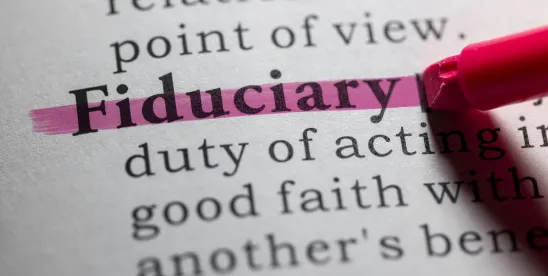Do recruiters have a fiduciary duty to their clients and candidates? Does AI?
What is a Fiduciary? AI says: “A fiduciary is a person or organization that is legally or ethically bound to act in the best interests of another party. Fiduciaries are required to preserve good faith and trust, and to disclose any conflicts of interest that could impact the other party. Fiduciary duties include duty of care, loyalty, good faith, confidentiality, prudence, and disclosure.”
In recruiting, candidates trust that a recruiter will keep their identities confidential and will not identify them to anyone without their permission. Law firms trust recruiters and consultants to be loyal and only use confidential information in good faith and not to use it for their personal interest such as to inspire a transaction in the future.
If the implied ethical duty was not enough, requisite terms that protect the candidate and client in these same ways are included in the recruiting agreement, reinforcing recruiters’ fiduciary duty to their candidates and clients.
When it comes to the fiduciary duty for attorneys, AI states: “An attorney's fiduciary duty is a professional aspect of the attorney-client relationship that involves acting in the client's best interests. This duty is a general duty of loyalty that can be summarized as a lawyer's obligation to act with fairness, trustworthiness, and good faith. It also includes other duties, such as confidentiality and disclosure.”
Similarly, AI Says: “A real estate agent's fiduciary duty is a legal obligation to act in their client's best interests, not their own. The National Association of REALTORS® uses the acronym "OLD CAR" to help agents remember the key points of their fiduciary duty: Obedience, Loyalty, Disclosure, Confidentiality, Accounting, Reasonable care and diligence.
These are also obligations of an attorney, financial advisor and legal recruiter. Like most employees in America, an attorney can be shown the door if they are found looking elsewhere, so candidates and law firms need all of these “old car” protections as well, further pointing to a fiduciary duty for legal recruiters.
Code of Ethics How can you tell if your recruiter is acting as a fiduciary?
Many top recruiters belong to the National Association of Legal Search Consultants (NALSC), an organization dedicated to promoting basic and comprehensive ethics meant to protect and elevate the industry. Some top and global recruiters do not belong to NALSC because of the mandatory arbitration clause between members. Other recruiting firms do not belong because they will not agree to NALSCs Code of Ethics which imposes fiduciary duties.
How do huge recruiting firms with over 200 recruiters navigate the AM200? Are they disclosing all of their conflicts, are they honoring all of their obligations? Large legal recruiting firms usually will not belong to NALSC because their excessive size makes it difficult for them to follow basic and comprehensive ethical requirements, especially regarding conflicts and “hands off” requirements.
Can AI belong to NALSC? Considering the qualifications needed to belong, I am going to guess no. AI is not an entity and so AI is not held to the NALSC ethics.
Top legal recruiter and highly esteemed NALSC Board Member Valerie Fontaine of Seltzer Fontaine LLC says: “Recruiters hold the candidate’s career in their hands and must do so with great care. We must make sure we keep their best interests in mind when advising candidates on career options, their presentation and interview skills, and guiding them in the job search process. Complete candor and confidentiality are paramount. Similarly, we can have an important impact on the growth trajectory of our employer-clients, and owe them an equal duty of care, candor, and confidentiality.”
Fontaine further explains “The NALSC Code of Ethics takes this into account and protects the interests of both candidates and clients (as well as our fellow recruiters) by setting out the minimum duty of care owed by recruiters. While not saying so explicitly, the Code reinforces the concept of the fiduciary duty expected of NALSC members.”
In practice, what should a recruiter do if they cannot service a long-time client, prospect or candidate? Similar to other professional industries, if there are conflicts and a recruiter cannot accommodate a prospect candidate or client at their own company for a specific transaction, the right thing to do is with their permission, pass them to someone they trust or advise them to find someone else.
Note: A prospect is a person or entity that fits the description of a qualified candidate. An actual candidate is someone who explicitly agrees to be a candidate for a specific position or opportunity. Candidacies have a shelf life with a term outlined in recruiting agreements, when that term is over they turn back into prospects.
Clients and candidates trust that a recruiter is acting in good faith and as a fiduciary for both sides. AI states: “A breach of fiduciary duty occurs when a fiduciary fails to act responsibly in the best interests of a candidate or client.”
Most recruiters carefully manage a select group of clients and candidates and carefully navigate between both obligations. How is this done? Very thoughtfully, with decades old industry standards to guide everyone involved.
Safeguarding confidential candidates and avoiding repeated submissions is something most recruiters learn right away to prevent a litigious situation. In the event this does happen, law firms also have a fiduciary duty to the confidential candidate and recruiter and are responsible for their obligations. This is why they have internal candidate confidentiality systems and policies in place and time stamps to discover a duplicate submission before it becomes an issue. Rarely, if foul play does occur and a candidate is submitted or shared without their permission, there are safeguards in place
In most all recruiting arrangements there is a non-solicitation agreement. Recruiters agree not to contact employees or partners at a firm they placed in for a period of time. If a candidate from a current client approaches a recruiter, they are typically outsourced or declined.
When recruiting in the legal sector, the candidate requiring the most delicate handling is one who controls a book of business or an entire law firm. If such a candidate or law firm is outed for exploring acquisition opportunities, it can give the wrong impression and cause extreme disruptions. Recruiters who are not following a fiduciary duty or code possibly could use this information for their benefit.
In the UK recruiting and employment agencies are regulated. For example, recruiters must comply with data protection laws, such as the General Data Protection Regulation (GDPR), which protects candidates' and hiring businesses' data. This means obtaining explicit consent for data processing, and allowing candidates to request that their data be deleted.
The Human Touch
Many of us in the legal recruiting industry believe that humans, rather than AI, will dominate legal recruiting for years to come because millions of valuable and high-level attorneys will not want this delicate process to be robotic where their identities could be passed in the wind.
Former teacher, now top Legal Recruiter Gary Miles of Miles Placement seems to agree from this comment on LinkedIn: “While I see AI having an increased role/value in firms' evaluation of partner/group opportunities in the near future, I don't think that automated recruiting tools will be replacing recruiters anytime soon. Particularly at the partner level, especially with the high-value targets."
I replied to that post: “I say the same thing. There is no way partners are going to be robotic about a highly sensitive moment in their careers.”
These high-level executives who operate in the realm of fiduciary duty expect the same from their representatives in these matters. After all, does AI even have a Fiduciary Duty?!!?




 />i
/>i
